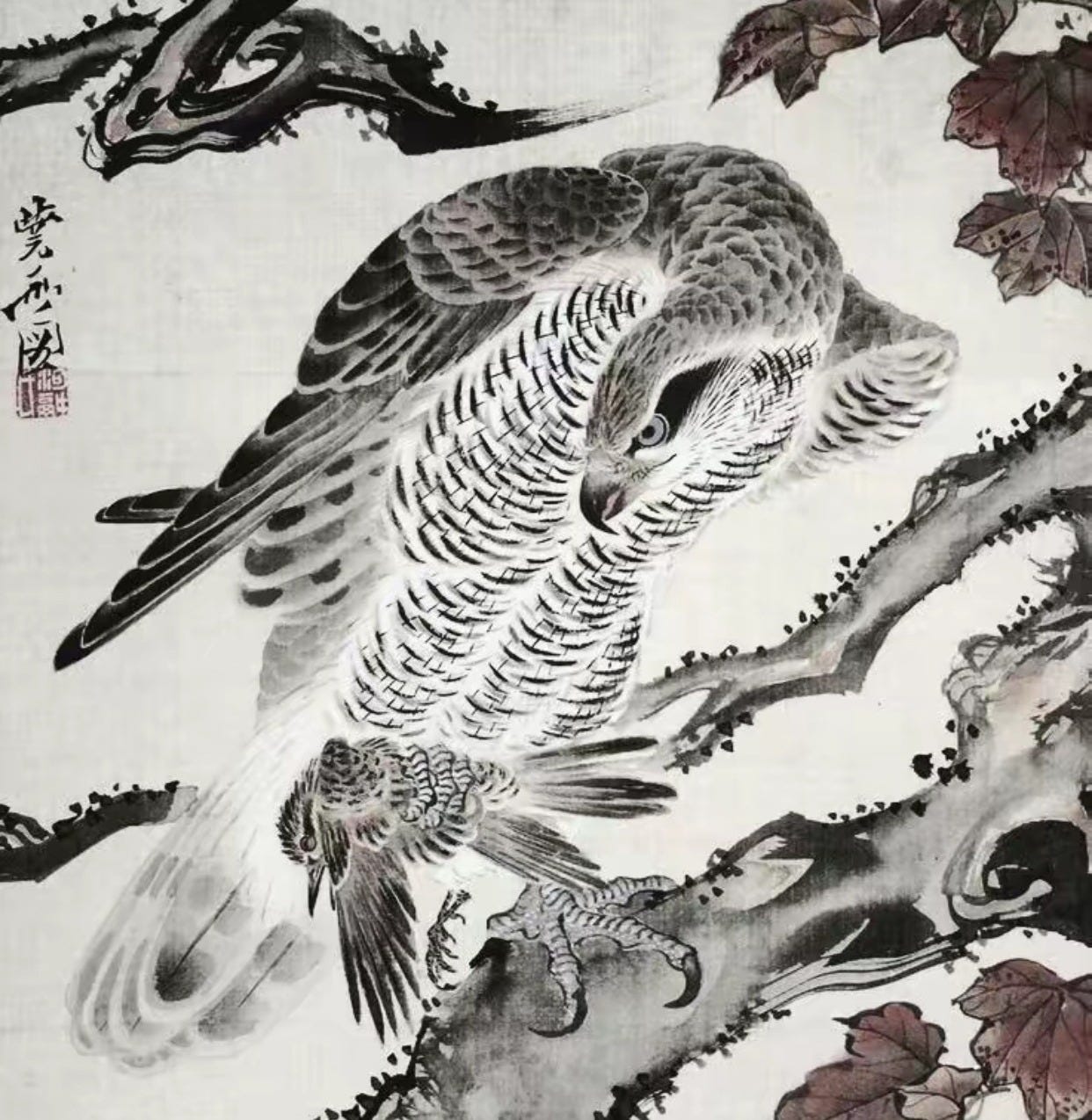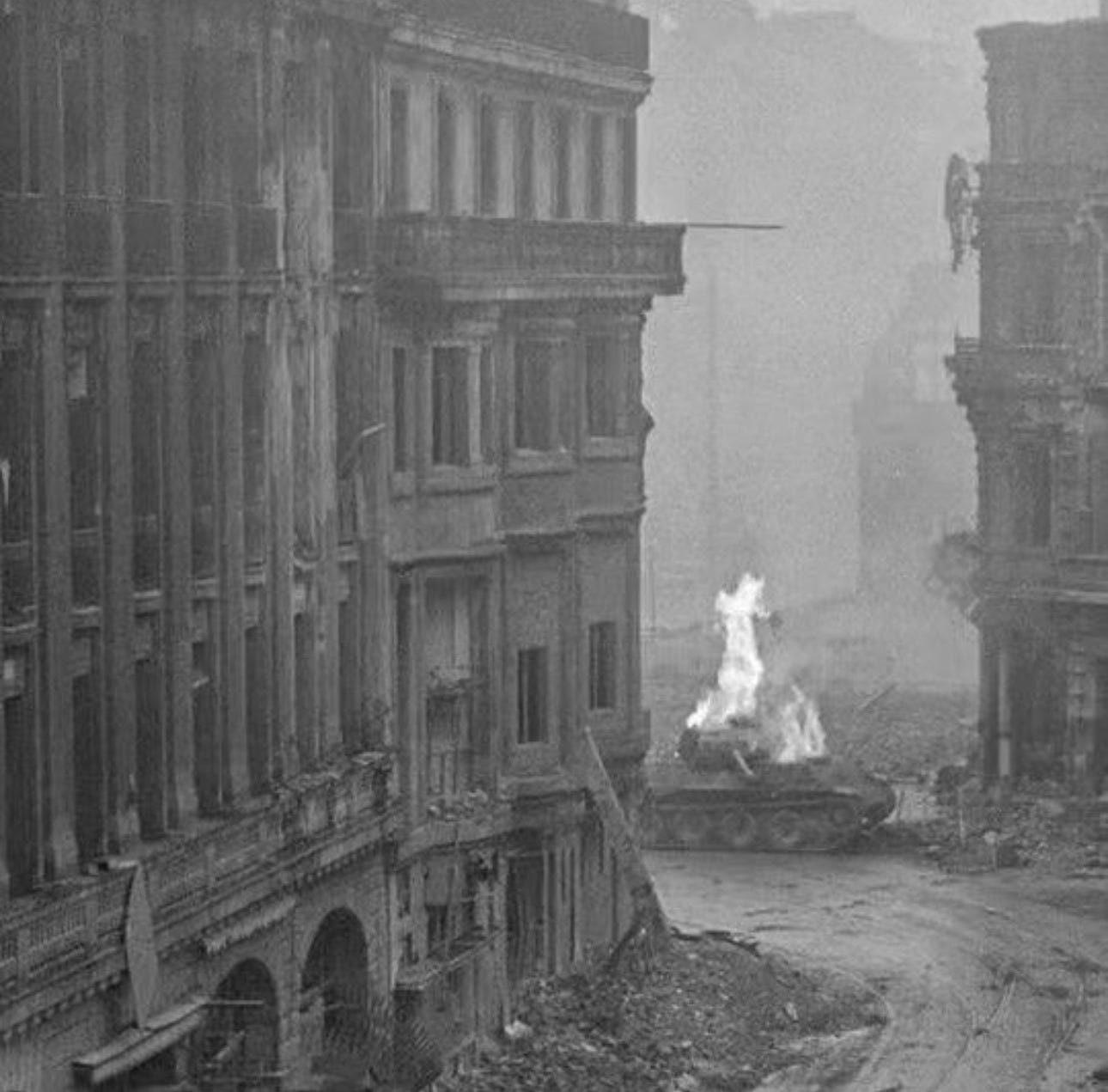Father of all Things
There are times when I am struck by a profound sense of defeat, of failure, of the ultimate futility of our opposition and struggle. The capacity to feel this at times, not just on the grand scale but also in your own life, is of great importance. To feel adrift in an ocean that seems hostile to you at every turn is the prerequisite for anything of real value. Genius, character, victory, and greatness are all made in two ways. Firstly, one is born a genius and that’s it. Secondly, immense pressure by the environment must be exerted on an individual so that he is spurred into action and revolt. His suffering will be the fertile soil from which the greatest acts, deeds, and works will be born. In this is hidden the failure of all progressive worldviews too.
Today the universities bustle with people all across the world. There is a huge inflation of the highly educated class and an oversaturation of virtually every bigger field. And yet, no profound invention or discovery of historic proportions has occurred. This arrangement should not be possible; you cannot have such a top-heavy society where huge proportions of the working-age population are highly educated but ultimately mid-level managers. There was once a remark by the British speaker Jonathan Bowden that went like this: “Trotsky believed that once communism has been established, there will be a Goethe on every street corner, there will be a Kant on every street corner, there’ll be all these on every street corner.” As he rightly concluded genius like that, and for that matter any genius in any serious field, is always against the grain, it’s hated while it’s alive but revered after it’s gone. Such people are exceedingly difficult and are not compatible with “respectable” society or with the average Joe. Such people are essentially freaks of nature. Even ignoring people of historic importance, someone who has a great character obtained it through great struggle. Anyone who has something to say or represents something of value attained that value through thick and thin. I am also reminded of the crap they teach in universities, such as in economics for instance where they lecture you on how to build or grow a business. Such things are attempts to systematize and synthesize someone’s historic business success and replicate it. But that’s not how it works. You can’t theorize yourself into greatness. Sure, you can learn something from such things of course. But such success ultimately comes from instinct and acting in the moment, in tune with what seems the right option, and with enormous hurdles along the way. What the university course in business told you doesn’t matter.
I was given a piece of wisdom from my grandfather long ago that states: “If you are lucky enough to suffer.” Essentially, our aversion to pain or pressure and all our attempts at building a “more fair and equal society” is a great crime against how certain things should be. I often look back on some of the formative moments of my youth, the various events, words, and actions that struck me and left a great impression. Without all of this I would not be who I am today. The moments of great loneliness, rejections and defeats of all kinds — all of them so necessary. Struggle is the father of all things, the endless tension between elements that vie to overcome one another. I’ve written about this before, but the mystery of life is hidden in its battle against all that wishes to destroy it. The will to life of life itself. From this tension and contradiction of various forces a new creation is brought forth. A new perspective, a new character, a new deed, a new man. Iron sharpens iron and in the furnace of life you are moulded. This is the value of struggle and suffering. It is a good thing that the longhouse of today will, in the end, fail in its attempts at creating a “safe and equal society” (a large kindergarten for women and olds) for peace always loses out against struggle because peace is the byproduct of victory in struggle, not the absence of it. It is dependent on a constant cycle of personal, cultural, societal, and historic confrontation and tension. To have peace and safety forever is impossible in the same way pacifism is impossible — you may be a pacifist but there will always be those who are not and therefore you lose. Constant and eternal peace would entail static conditions, while life is dynamic, flexible, and unpredictable. These are also the core tenants of struggle, not of peace. Fairytales from humanists and progressives (from a moral point of view) rest on the belief that by imposing all-encompassing reforms in all areas of life the dynamism and virility of life itself will be eliminated by removing any possibility for difference and tension between two or more elements, since they would all be equalised.
Struggle as a Foundation of Political Worldview
To expand all this into morality and politics now, the capacity to feel struggle deeply is a prerequisite for the Right. It views struggle and suffering as moral goods and as inseparable parts of life on this Earth. A type of pessimism and determinism permeates its moral frameworks. This is where biology and politics meet and one’s inborn character, genetic, and chemical makeup can to a great extent determine one’s morality and worldview. Simple things such as an excess or lack of testosterone affect this as well. Now despite their so-called aversion to religiosity, the Left is a deeply religious phenomenon that attempts to find solutions to suffering and struggle. It ultimately views these things as evil and as a type of failure on behalf of the world. Their calls for endless reforms, progress, improvement, welfare are all driven by the deeply religious and moral feeling that such things must be fixed, whereupon endless peace will reign in the world. For a short time, I thought so too, but in the end, I drifted away from such moralisations. Where a Leftist/humanist type might decry injustices in daily or average life, I came to the conclusion that not only will you not get rid of injustice as a fact of life but even if you did you would be robbing the victim of deep realignment, growth, change, and perseverance. The tyranny of socialistic understandings of the world (here “socialistic” refers to humanism, social justice, equality, peace) is in their hope of “fixing” the world which leads to micromanagerial suffocation of natural life. It would be a great tragedy to get rid of suffering, struggle, defeat, failure, social exclusion, ridicule, and sadness in the hopes of creating a new type of man of the utopia. In the end those who would be of a truly higher type would necessarily have to go against the utopia, they would wish pain and suffering back. Education reform, labor reform, political plans and programs that hope to shape a certain type of person, all fail because those few truly great ones will always have to be against the grain. There is no other way. You won’t be able to manufacture them in a factory. Only some overall frameworks and environments are conducive to the emergence of a certain type of person that is of greater value than what we have today. Such was the case long ago and all of them included great suffering and environmental pressures. Micromanagement, however, won’t work. Even the question of injustice, in a broad sense and in various understandings, is brought up. Do you have the “right” to force someone or something to not do you injustice?
On the other hand, the Right is different when it comes to this. It fundamentally accepts the arrangement of existence and seeks to live in accordance with it, letting it shape a subject (a person, state, society, civilisation). It encourages struggle as an important step in one’s own life that will transform him, as well as on a societal level. It views life ultimately as Will to Power even if this isn’t stated. Discipline, order, unity, honor, and duty all play central roles in the moral framework of the Right because these are tools to endure and transform the suffering and struggle of life into value. Interestingly, this is why physical fitness and training is almost always correlated with belonging to the Right. The importance of inequality here is also evident, because the Right views inequality as a moral and natural good where those more capable for something in particular and for life’s struggle in general ought to have greater rights and privileges than others.
However, this does not relate to the contemporary “Right”. Even if some of the individuals within it are not, the overall framework is Leftist. They all use Leftist moral arguments of “the greatest happiness for the greatest number”, social justice, inequality and equality, peace and so on. They all wish to “improve” life and progress to some future end point that just has a “traditional” paintjob. I bring this up because it isn’t uncommon for me to hear: “You should just form a political party” or something along those lines. Ignoring the fact that party democracy itself is something I don’t wish to see surviving this century and therefore I can’t counter such suggestions because most normal people won’t get it, the best I can say to that is that we don’t need yet another party, the proud 789th addition to our sacred democracy. I don’t want to present yet another program of how I or we want to micromanage society. Whilst it is true that great upheavals of the last century were done through political parties, this was at a time when such things were young and flexible. Political parties began forming in any real capacity during the second half of the 19th century. Within 50-60 years most of what could be done through such organisations was. For the past 80 years political parties have calcified into centre-left and centre-right creations where they all share and uphold the same dogma of egalitarianism, democracy, endless economic growth and the like. There is no creativity left. The political party is a relic of a bygone era, new forms and ways will have to take its place. Ultimately, the goal would be a massive moral realignment of our world, something akin to the French Revolution and the way it set the stage for our current prevailing moral framework. Such things are not possible purely through political action. Rather, they require outside pressures that would force cultural changes and only then can they take a political form. So, forming another “national” political party that would attempt something in 4 or 8 years without first having the fertile cultural and moral ground to do so is a joke.
The Left and the Right, as philosophical and moral phenomena, are two archetypes. The Left is in perpetual revolt against the “inconvenience of existence” while the Right accepts it and uses it for transformation. I often get the feeling that people of a Leftist persuasion (I mean this once again morally and not strictly politically) don’t like or enjoy life at its core. All their talk of love between people, understanding, tolerance, care and such comes from their inability to deal with life. It’s something like a façade, a mask. It is no wonder that such people are statistically far more likely to identify as being depressed or having some mental illness (people who do not have this kind of persuasion define these things differently and do not feel them in the same way). This is why I drifted away from Leftism many years ago. The relationship of humanist morality towards pain is one of a victim, where they unwillingly endure it and seek to avoid it whenever possible. I never believed that avoiding these things was productive. They always end up closing themselves further and further into some fantasy utopia of their own making for fear of feeling pain. It is also not uncommon for people of a humanist understanding of things to commit suicide out of nothing more than despair.
This now brings us to the relationship that the moral Left and Right have with death. For the humanist progressive death is something that must be avoided at all costs, hence his love of peace and safety. They seek to prolong life for as long as possible, even if it has been robbed of any creativity or dignity. The modern healthcare system is the physical embodiment of this morality and not just strict technological advancement. However, the humanist is not afraid to bloody his hands in the destruction of those he views as “enemies of peace and tolerance”. Never forget than man is still a predator. Meanwhile, the Right considered death unavoidable and at times even a great ending to a fulfilled purpose. To give one’s life for an ideal and its actualization is a core aspect of much of the Right’s thinking. In this vein, suicide for the anti-humanist isn’t something done out of despair or impulse. It is, like in Japanese Seppuku, a way to rob the enemy of victory over you. To preserve honor and purity to a degree. It is a very deliberate act of defiance of the odds that life has stacked against you. If one was to continue down this line of thinking and feeling he will arrive at the following: to live past a certain point, where it is clear that all creativity and youth has left you, is a great tragedy and not a worthwhile endeavour.
Conclusion
I dislike modern party politics because it rests on the false premise that “we might disagree but we can live in peace”. The worldviews and moralities of different political factions are the way they are for a reason. It’s not about disagreeing with this or that policy, it’s about fundamentally viewing the world from a different spiritual, moral, and even biological standpoint and what end goals we should pursue. Political violence should come as no surprise, although most normal people will probably not be able to come to terms with it. For all of human history the goal was to defeat your enemies and eradicate them out of existence, so they never again pose a threat. Giving them something like a parliament or something where we can just “hear each other out” is a complete anomaly on the natural and cosmic level. The political Left has, as we know, been far better at fighting its enemies ever since the end of WWII. They have had no issue with ruining people’s careers or even lives if it meant gaining power, media smear campaigns, lies, falsification of entire scientific fields and much more. Your typical mainstream rightist will just say “yeah but imagine if the roles were reversed, that’s why I can’t be ruthless”, failing to realize that the goal is to never allow the roles to reverse ever again. The issue here is again the humanist attempt at equalising different opposed elements. Liberal democracy and party politics rely on the hope that enemies, so people with radically different moralities and goals, will adhere to the rules of the game when they are in government or have institutional and cultural power, rather than take things to their logical conclusion and attain total dominance.





